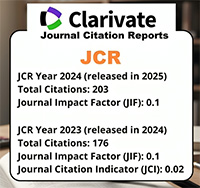¿Diabetes post COVID-19?
Resumen
La diabetes mellitus (DM) es una de las enfermedades crónicas que supone una enorme carga para los sistemas sanitarios del mundo. Esta es una enfermedad de etiología multifactorial caracterizada por hiperglucemia crónica asociada con resistencia a la insulina (RI) y una respuesta compensatoria inadecuada en la secreción de esta hormona 1. La DM es un síndrome que comprende una serie de etiologías moleculares progresivamente emergentes que pueden presentarse con diferentes subfenotipos 2.
.
Descargas
Citas
Wagner R, Heni M, Tabák AG, Machann J, Schick F, Randrianarisoa E, Fritsche A. Pathophysiology-based subphenotyping of individuals at elevated risk for type 2 diabetes. Nature Medicine 2021; 27(1): 49-57. https://doi.org/10.1038/s41591-020-1116-19.
Nyunt TPK, Mullol J, Snidvongs K. Immune response to fungi in diabetic patients with invasive fungal rhinosinusitis. Asian Pac J Allergy Immunol 2020; 38(4):233-238. Doi: 10.12932/ AP-080620-0874.
Rubino F, Amiel SA, Zimmet P, Alberti G, Bornstein S, Eckel RH, Mingrone G, Boehm B, Cooper ME, Chai Z, Del Prato S, Ji L, Hopkins D, Herman WH, Khunti K, Mbanya JC, Renard
E. New-Onset Diabetes in Covid-19. N Engl J Med 2020; 383(8):789-790. Doi: 10.1056/NE- JMc2018688.
Sathish T, Kapoor N, Cao Y, Tapp RJ, Zimmet P. Proportion of newly diagnosed diabetes in COVID-19 patients: A systematic review and meta-analysis. Diabetes Obes Metab 2021; 23(3):870-874. Doi: 10.1111/dom.14269.
Beyerstedt S, Casaro EB, Rangel ÉB. COVID-19: angiotensin-converting enzyme 2 (ACE2) expression and tissue susceptibility to SARS-CoV-2 infection. Eur J Clin Microbiol Infect Dis 2021; 40(5):905-919. Doi: 10.1007/s10096-020-04138-6.
Molina DI, Muñoz TM, Guevara K. Inhibidores de la enzima convertidora de angiotensina y bloqueadores de los receptores de angiotensina II: ¿aumentan el riesgo de padecer COVID-19? Rev Colom Cardiol 2020: 27(3): 132-136. https://doi.org/10.1016/j.rccar.2020.05.003.
Ata A, Jalilova A, Kırkgöz T, Işıklar H, Demir G, Altınok YA, Özkan B, Zeytinlioğlu A, Darcan Ş, Özen S, Gökşen D. Does COVID-19 predispose patients to type 1 diabetes mellitus? Clin Pediatr Endocrinol 2022; 31(1):33-37. Doi: 10.1297/cpe.2021-0050.
Suwanwongse K, Shabarek N. Newly diagnosed diabetes mellitus, DKA, and COVID-19: Causality or coincidence? A report of three cases. J Med Virol 2021; 93(2):1150-1153. Doi: 10.1002/jmv.26339.
Duntas LH, Jonklaas J. COVID-19 and thyroid diseases: A bidirectional impact. J Endocr Soc 2021;5(8):bvab076. doi: 10.1210/jendso/bvab076.
Spranger J, Kroke A, Möhlig M, Hoffmann K, Bergmann MM, Ristow M, Boeing H, Pfeiffer AF. Inflammatory cytokines and the risk to develop type 2 diabetes: results of the prospective population-based European Prospective Investigation into Cancer and Nutrition (EPIC)- Potsdam Study. Diabetes 2003; 52(3):812-7. Doi: 10.2337/diabetes.52.3.812.
Bender C, Rajendran S, von Herrath MG. New insights into the role of autoreactive CD8 T cells and cytokines in human Type 1 diabetes. Front Endocrinol (Lausanne) 2021;11:606434. Doi: 10.3389/fendo.2020.606434.
Katsogiannos P, Kamble PG, Pereira MJ, Sundbom M, Carlsson PO, Eriksson JW, Espes D. Changes in circulating cytokines and adipokines after RYGB in patients with and without Type 2 diabetes. Obesity 2021; 29(3):535-542. Doi: 10.1002/oby.23093.
Valero Cedeño NJ, Vélez Cuenca MF, Duran Mojica AA, Torres Portillo M. Afrontamiento del COVID-19: estrés, miedo, ansiedad y depresión? Enferm Inv 2020;5(3):63-70. http://dx.doi. org/10.31243/ei.uta.v5i3.913.2020.
Guarnotta V, Ferrigno R, Martino M, Barbot M, Isidori AM, Scaroni C, Ferrante A, Arnaldi G, Pivonello R, Giordano C. Glucocorticoid excess and COVID-19 disease. Rev Endocr Metab Disord 2021; 22(4):703-714. Doi: 10.1007/s11154-020-09598-x.





















